De Italiaanse schrijver Andrea De Carlo werd geboren in Milaan op 11 december 1952. Zie ook alle tags voor Andrea De Carlo op dit blog.
Uit: Due di Due (Vertaald door Paula Geldenhuys)
“I observe the confused mass of heads and busts in motion, hoping to recognize the hair of a girl whom I saw a few days earlier, and instead I’m struck by the gaze of one who is trying to make his way with an expression of concentrated estrangement.
It is the gaze of an uninvited guest, of a stowaway: a gaze dissociating from his own lineaments, from his own way of turning his head to the right and to the left.
Then in the reconstructed recollection there is a void, wherein Guido Laremi with his extraneous gaze is reabsorbed into the background. I free my motor scooter from the chain and I crank it up, and these simple doings cost me fatigue and repetition, anger against the objects.
I’m on, at length, and I’m trying to cut my way through the people and the cars, and I hit somebody. I feel a knock on one side of the handlebars; I sway and lose my balance; I fly over the scooter dragged by my heavy greatcoat, by the canvas-bag filled with mandatory books.
Some round heads and long necks, some apple or pumpkin or pine-seed-like faces, some bunker-slit or bottle-end or wide-screen-like pair of spectacles turn around in the jumble of movements; they look away as soon as I’m back on my feet with no interesting damage.
A couple of meters from me Guido Laremi is pressing a hand on his flank, says «Damn». He is more or less my age, blue eyes, disheveled, fairish hair. He’s wearing an English raincoat, but it wears too short on him; he, too, keeps his collar raised. He is staring at me, and his gaze is now filled with irritation, other than extraneousness.
I tell him «I’m sorry»; I pull up my motor scooter. All about streaming-out students continue to knock and push and press one another, amidst grumbles and squeaks and laughs and guttural cries.”
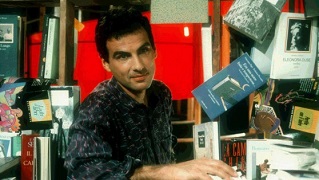
Andrea De Carlo (Milaan, 11 december 1952)
De Egyptische schrijver Naguib Mahfouz werd geboren op 11 december 1911 in Caïro. Zie ook alle tags voor Naguib Mahfouz op dit blog.
Uit: Rhadopis of Nubia
“In only a few days, Abu and its two islands, Biga and Bilaq, were packed with visitors. Houses filled up with guests and tents crowded the public squares. Throngs of people moved through the streets and gathered around the conjurers, singers, and dancers. A multitude of traders hawked their wares in the markets and the fronts of houses were decorated with banners and olive branches. The people’s eyes were dazzled by the groups of royal guards from the island of Bilaq with their ornate uniforms and long swords. Bands of pious believers hastened to the temples of Sothis and the Nile, making vows and giving offerings. The songs of the minstrels mixed with the drunken cries of the revelers as a mood of unbridled joy and raucous entertainment pervaded the normally composed atmosphere of Abu.
Finally the day of the festival arrived. Everyone made their way to one place, the long road stretching between Pharaoh’s palace and the hill upon which stood the temple of the Nile. The air was hot from the excitement in their breath and the earth strained under their weight. Many despaired of ever finding a place on land and went down to the boats and set sail to the temple hill, singing Nile songs to the accompaniment of flutes and lyres, and dancing to the beat of drums.
Soldiers lined the edges of the great road lances at the ready. At equal distances apart, life-size statues of the kings of the Sixth Dynasty had been erected, Pharaoh’s father and forefathers. Those nearest to the front could see the pharaohs: Userkara, Teti I, Pepi I, Mohtemsawef I, and Pepi II.
The clamor of voices filled the air, each one impossible to distinguish, like the waves on a raging ocean, leaving no trace except an awesome, all-encompassing uproar. Now and then, however, an especially powerful voice would stand out, crying: “Glory be to Sothis who has brought us glad tidings!” or “Glory be to the sacred Nile god who brings life and fertility to our land!” And here and there voices requested the wines of Maryut and the meads of Abu, calling for merriment and forgetfulness”.
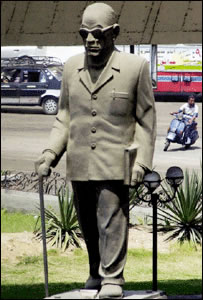
Naguib Mahfouz (11 december 1911 – 30 augustus 2006)
Standbeeld in Caïro
De Vlaanse dichter Paul Rigolle werd geboren in Roeselaere op 11 december 1953. Zie ook alle tags voor Paul Rigolle op dit blog.
Vaart
Is het Stilstand waarvan hij droomt? Een pas op de plaats,
een halt die iemand toegeroepen wordt. Met gebrek
en bomen, neemt hij de vaart uit het leven weg. Stilstand,
het kleine, bleke broertje van de dood, is een verlangen
dat maar even duurt, hij weet het best, maar zijn arm
drukt door wat in zijn hoofd wordt uitgeklaard.
Zichzelf opzij gezet, vriest hij liever vast. Hoe stilte
daarop volgen moet en daarvan overblijft, de zon
die roerloos tussen de populieren hangt, een dooier
in zijn oog, het water ijs geworden waarop
hij staat. Eén en al oor alweer voor de stemmen
die zich ballen tot een schreeuw waarvan hij schrikt.
De eerste schaatsers slijpen hun messen op de vaart.
Oker
Wat goed is komt snel, zegt men,
maar soms duurt alles langer dan verhoopt.
Je zoekt buiten wat wel vaker alleen van binnen zit.
Hartstocht komt en gaat, wat gebeuren moet
gebeurt, een niemandsland is om door te gaan.
Leiden ligt in Nederland, durven is een kunst,
wie bang is wordt gebeten. Luister hazenhart,
maak geen moordkuil van dat hart van jou,
leg de oren aan de grond, raak met oker in de weer
en herbegin. De weg die harten kunnen gaan is kort
het is maar even, maar soms is dat genoeg.
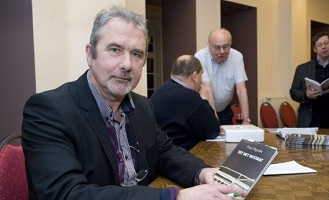
Paul Rigolle (Roeselare, 11 december 1953)
De Oostenrijkse dichter, schrijver en vertaler Ludwig Laher werd geboren op 11 december 1955 in Linz. Zie ook alle tags voor Ludwig Laher op dit blog.
Uit: Selbstakt vor der Staffelei
„Allgemeingültig, was heißt allgemeingültig. Wer will denn schon sein wie wer anderer, ich will ja nicht mich sehen in dem, den ich sehen will. Aber ich will sehen, will fühlen, daß da einer war, daß da einer ist, und zwar so und nicht irgendwie. Daß da einer sieht, und zwar so und nicht irgendwie. Daß einer, daß etwas unverwechselbar ist, bleibt, unauslöschlich über das Auslöschen hinaus. Nicht ewig, was heißt ewig. Sondern gegen den Schein, gegen die Schublade, gegen den Staub, gegen den Schutt da ist, lebendig, jetzt da ist, weg war, ganz weg war, ganz da ist. Dem Mittelmaß das Maß entgegensetzt, nicht das Übermaß, nicht das Genie, was heißt Genie.
(…)
Janssen will, muß die Arbeit mehrmals unterbrechen. Schmerzen. Mit den Päpsten ist er fertig: Pius sieben, der in Janssens Jugend mit fast dreihundert Jahren Verspätung treuen Katholiken das kopernikanische Weltbild zu erwägen gestattet, Leo zwölf, der Prediger des Pockenstrafgerichts, ein weiterer Kurzzeit-Pius, schließlich Gregor sechzehn, der ist gerade am Ruder, Schluß, aus, Punkt. Noch drei Fensterbilder, da bricht die Geschwulst am Daumen auf, heilt nicht mehr: Chlodwig wird getauft, der Heilige Fridolin erweckt den toten Ursus, der Heilige Arbogast ruft den Sigbert ins Leben zurück. Ins Leben.”
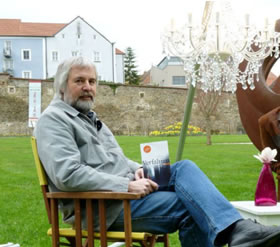
Ludwig Laher (Linz, 11 december 1955)
De Oostenrijkse dichter, schrijver en rechter Janko Ferk werd geboren op 11 december 1958 in Sankt Kanzian am Klopeiner See, Kärnten. Zie ook alle tags voor Janko Ferk op dit blog.
WILDER WEIN
du behauptest dich
nicht
am weg
deine reife
gilt am ziel
die sonne
ist
deine option
der regen
verschlechtert
den vertrag
die beiden
südlicheren tage
vollenden
die abmachung
und geben
die schwere
JETZT SCHREIBE ICH
auf dem langen weg
durch die kalte stadt
schreibe ich
von den häuserzeilen
ab
chöre in einem anderen licht
buchstabiere ich
das umfassende verstehen
der lieder
und bin doch nur
auf die stimme
des einzelsängers
aus
auf meinen widerklang
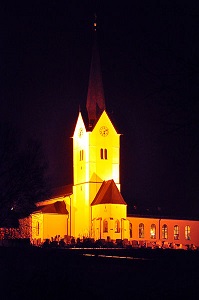
Janko Ferk (Sankt Kanzian, 11 december 1958)
Sankt Kanzian, parochiekerk
Zie voor nog meer schrijvers van de 11e december ook mijn blog van 11 december 2012 en ook mijn twee blogs van 11 december 2011.
